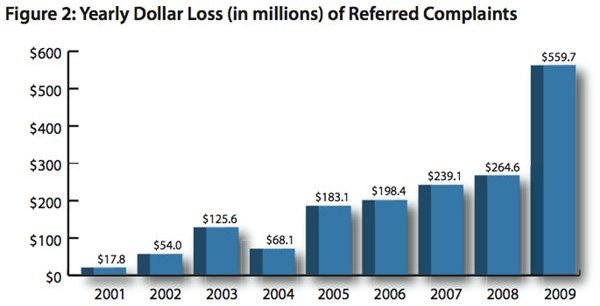Online Fraud Costs - Learn the Monetary Costs and Intangible Costs Caused by Online Fraud
Who Tracks Online Fraud Costs?
An exact calculation of online fraud costs is hard to come by. Many online fraud cases are not reported or, not even found until much later. The cases that are reported are captured by the Internet Crime Complaint Center, which is a partnership between the FBI, the National White Collar Crime Center and the Bureau of Justice Assistance. Due to the constant evolving nature of cyber crime and the overlap from the crimes, the Internet Crime Complaint Center does not focus on one type of online fraud.
In previous articles, I’ve written about pretexting, social engineering, cyber crime and phishing, which are all different types of online fraud.

The Internet Crime Complaint Center measure reported cases of those types of online fraud and more, including investment fraud, auction fraud and a flurry of other online fraud cases. The problem with these numbers is that they’re not entirely accurate. Many people do not know of the Internet Crime Complaint Center and do not report their cases. In some cases, such as the largest online fraud case in history, the cyber crime isn’t identified until a few years later.
Yet, they are the most reliable source one could hope for in compiling the costs of online fraud cases. They have been compiling all the online cases, and the costs associated since 2000. From 2001 onward, they have created annual reports outlining the costs of online fraud cases. These annual reports combine the costs associated, the number of cases, as well as the median cost of loss from online fraud.
What Are Monetary Online Fraud Costs?

According to the first annual report filed by the Internet Crime Complaint Center in 2001, the costs associated with online fraud were estimated at $17.8 million! The majority were from auction frauds, which ran rampant with the rise of eBay. In the grander scheme of crimes, $17.8 million is not a lot of money. Cyber crime was still in its infancy, using naivety as a tool to trick people into falling for the online scam.
Year after year, the cost of online fraud has gone up. It more than doubled in 2002, rising to $54 million, and further rose to $125.6 million in 2003. Currently, as of the 2009 report, online fraud costs are nearly at $560 million! That’s an alarming amount of money being lost to criminals around the world. Auction fraud has actually lowered, thanks in part to the increased education of consumers and beefed up security from sites such as eBay. Sadly though, the simplest form of online fraud, email scams have taken the lead for the number of reported cases. Ironically, the email scams often use fraudulent accounts with FBI addresses to steal information from victims.
Another interesting fact is that the majority of crimes are actually not high loss crimes. In fact, the majority of the costs per case fall below $1000. The online fraud cases that cost millions of dollars are actually rare, or it’s possible that they’re not being reported.
What Are Other Online Fraud Costs?
Money isn’t the only cost of online fraud. For companies, online fraud can cause reputation damage, loss in consumer confidence and layoffs for some groups. In addition, companies have to track down where and how the online fraud occurred to cover for possible future losses. This is a huge waste of time and resources as they are scrambling to lock down security flaws they missed or ignored. Time that could be used to enhance a product or create a competitive advantage.
For individuals, the most important loss is the loss of time. Identity theft is a constantly rising crime, and as of 2009, was ranked 4th in the top 10 most common cases. The painful aspect of identity theft is that you have to fix a long line of issues, and you have to constantly monitor your credit, as social security numbers are not easy to change. Valuable time is wasted in fixing credit, retaking accounts, tracking down where your identity was used, and in addition, monitoring your identity. As the saying goes, time is money, and it’s being wasted hunting down criminals who can hide anonymously. Individuals also suffer from damage to their reputation, as online fraud can involve criminals using your identity to commit all kinds of crimes and embarrassing online orders. The intangible online fraud costs can be more impactful and stressing than the monetary costs.